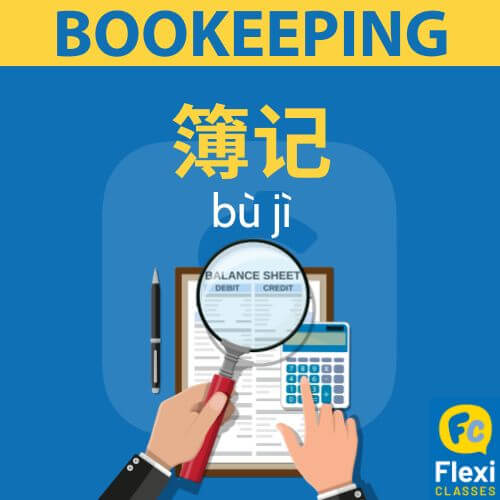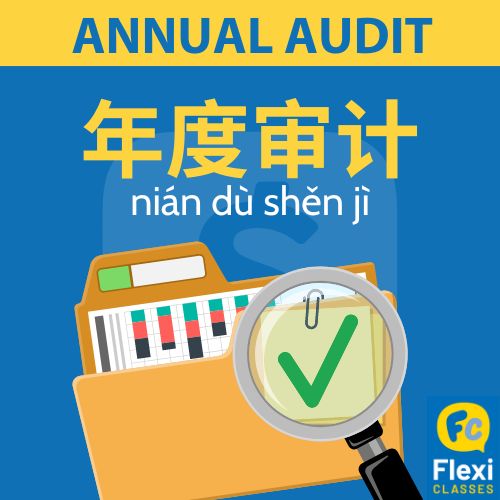Finance and Accounting 🪙 Key Terms for Business Chinese
Read Financial Reports and Master Financial Discussions in Chinese Effortlessly

Now that you’re doing business in China, you should have grasped some Chinese to communicate well with the locals.
But when you’re dealing with financial reports and accounting terms in Chinese, you have to be extremely diligent.
👉 Familiarizing yourself with key terms and phrases is the best first step you can take.
It must also be noted that Google Translate can’t always be relied on to provide you with accurate translations. That certainly won’t do your business any good!
But luckily for you, in this blog post, we’ll introduce to you all the key phrases for financial discussions and essential accounting terms you’ll need to do business in China. 💼
Finance and Accounting Terminology in Chinese || General Accounting Terms
Finance and Accounting Terminology in Chinese || Specific Accounting Terms
Finance and Accounting Terminology in Chinese || Basic Financial Concepts and Terms
Finance and Accounting Terminology in Chinese || Key Vocabulary for Financial Reports and Statements
Finance and Accounting Terminology in Chinese || Essential Phrases for Financial Discussions
Finance and Accounting Terminology in Chinese || FAQs
Finance and Accounting Terminology in Chinese || General Accounting Terms 🎯
First, let’s dive into some basic accounting terms to manage finances and communicate effectively in finance conversations.

会计
kuài jì
Accounting
会计师
kuài jì shī
Accountant
她是一名资深的会计师。
Tā shì yī míng zī shēn de kuài jì shī.
She is an experienced accountant.
Most of the time, in the business environment, you’ll just hear people refer to accountants as 会计 (kuài jì) as well 📝
When referring to a specific person, you’ll add the surname of the accountant before 会计 (kuài jì).
For example 👉🏻
你可以问张会计nǐ kě yǐ wèn zhāng kuài jì
You can ask Accountant Zhang
账本
Ledger妥善保管账本tuǒ shàn bǎo guǎn zhàng běn
Properly keep the ledger

簿记
bù jì
Bookkeeping
负责公司日常的簿记工作。Fù zé gōng sī rì cháng de bù jì gōng zuò.
Responsible for the daily bookkeeping work of the company.
Finance and Accounting Terminology in Chinese || Specific Accounting Terms
Now we get down to the specific terms when taking about money flows in accounting 💰
收入
shōu rù
Revenue
成本chéng běn
Cost
| VOCABULARY | EXAMPLE |
|
收入
shōu rù Revenue |
公司的收入逐年增长。
Gōng sī de shōu rù zhú nián zēng zhǎng The company’s revenue has increased year by year. |
|
成本
chéng běn Cost |
我们需要找到降低成本的方法。
Wǒ men xū yào zhǎo dào jiàng dī chéng běn de fāng fǎ. We need to find ways to reduce costs. |
Now that there are different types of costs. The most essential term for cost is COGS.
销货成本 (xiāo huò chéng běn) – COGS
To describe the going trend of COGS, you could say:
销售成本有所增加。
xiāo shòu chéng běn yǒu suǒ zēng jiā.
COGS has increased.
There is also operating cost.
运营成本
yùn yíng chéng běn
Operating Costs
支出
zhī chū
Expenditure
控制公司的支出。kòng zhì gōng sī de zhī chū.
Control the company’s expenditures.
利润
lì rùn
Profit
本季度的利润有所增加。
Běn jì dù de lì rùn yǒu suǒ zēng jiā.
The profit for this quarter has increased.
This is what you care the most about a business. You’ll often hear it a lot.
When talking about profit margin, Chinese people usually use this word to refer to it:

盈利
yíng lì
Profit margin
For example, when investors in China ask about the profit margin of a project, they usually say:
这个项目盈利有多少点?Zhè ge xiàng mù yíng lì yǒu duō shǎo diǎn?
What’s this project’s profit margin?
When talking about a company’s assets, there are several parts of it, such as cash, equipment, and inventory.
| CHINESE | ROMANIZATION | ENGLISH |
| 资产 | zī chǎn | Assets |
| 现金 | xiàn jīn | Cash |
| 设备 | shè bèi | Equipment |
| 库存 | kù cún | Inventory |
💵 This is also a term to pay attention to, especially if you’re doing business in large scale.
负债
fù zhài
Liabilities
公司目前的负债水平较高。
The company’s current level of liabilities is relatively high.These are a few liabilities that you always look out for when assessing a company’s financial situation.

股东权益增加了10%。Gǔ dōng quán yì zēng jiā le 10%.
Shareholders’ equity increased by 10%.
股东权益
gǔ dōng quán yì
Shareholders’ Equity
应收账款
yīng shōu zhàng kuǎn
Accounts Receivable
我们需要收回应收账款。
We need to collect the accounts receivable.Sometimes, in the fast-paced business environment, people usually refer to Accounts Receivable in a shorter term 应收 (yīng shōu).
应付账款
yīng fù zhàng kuǎn
Accounts Payable
请尽快支付应付账款。
Please pay the accounts payable as soon as possible.So is the case here for more fast-paced communication, you’ll just hear Chinese people say 应付 (yīng fù) in short.

Your Ultimate Guide: Key Phrases For Business Trips in China ✈️
Want a Stress-Free Business Trip? Learn Key Phrases for Booking Flights, Hotels, and Transportation in Chinese Travelling for business in China can be both exciting and challenging. Even though it’s becoming more common for the staff to speak English in…
Finance and Accounting Terminology in Chinese || Basic Financial Concepts and Terms 🎯
👉 Great! Now let’s dive deeper into some helpful words when assessing financial situations.
毛利 (máo lì), or Gross profit, is the difference between revenue and the cost of goods sold 💰
It’s the strongest indicator of a company’s product profitability. Often you’ll hear investors ask about the gross margin of a company like:
毛利率有多少?
What’s the gross profit margin?毛利
máo lì
Gross Profit
损失
LossLoss occurs when expenses exceed revenue.
Be sensitive to hearing this word because it often leads to more detailed discussions with specific terms.
For example, a conversation to talk about loss often starts with a sentence like this:
由于市场不景气,公司今年遭遇了重大损失。Yóu yú shì chǎng bù jǐng qì, gōng sī jīn nián zāo yù le zhòng dà sǔn shī.
Due to the market downturn, the company faced significant losses this year.
Cash flow is also what you should focus on when running a business in China, especially when it involves different currencies.
现金流
xiàn jīn liú
Cash Flow
良好的现金流是关键。
Good cash flow is key.You won’t miss reading financial statements when talking about those terms mentioned above.

财务报表
cái wù bào biǎo
Financial Statements/Reports
Financial statements are usually released every quarter. So you’ll often see sentences like:
公司第一季度财务报表
Gōng sī dì yī jì dù cái wù bào biǎo
The company’s financial statements of the first quarter.
资本
zī běn
Capital
👉 This term is regularly mentioned when talking about financial situations in different scenarios.
Often you’ll hear it a lot when capitalists talk about investments.
For example:
增加新一轮的资本投入。zēng jiā xīn yī lún de zī běn tóu rù.
Increase capital investment in the new round of funding.
Finance and Accounting Terminology in Chinese || Key Vocabulary for Financial Reports and Statements 📊
These are some advanced terms to read in financial statements. They help you understand various aspects of a company’s financial situation more deeply.
我们需要审核公司的财务报表。
Wǒ men xū yào shěn hé gōng sī de cái wù bào biǎo.
We need to review the company’s financial reports.
Then, there are several detailed sheets in the set of financial reports.
| 资产负债表 zī chǎn fù zhài biǎo Balance Sheet |
资产负债表显示公司的财务状况。
Zī chǎn fù zhài biǎo xiǎn shì gōng sī de cái wù zhuàng kuàng. The balance sheet shows the financial condition of the company. |
| 利润表 lì rùn biǎo Income Statement |
利润表总结了公司的收入和支出。
Lì rùn biǎo zǒng jié le gōng sī de shōu rù hé zhī chū. The income statement summarizes the company’s revenues and expenses. |
| 现金流量表 xiàn jīn liú liàng biǎo Cash Flow Statement | 现金流量表反映了公司的现金流动情况。 Xiàn jīn liú liàng biǎo fǎn yìng le gōng sī de xiàn jīn liú dòng qíng kuàng. The cash flow statement reflects the company’s cash flow situation. |
As you read through various metrics in the financial reports, the one you care about the most is the company’s assets.
There are always several different types of assets based on their specific definitions.
净资产
jìng zī chǎn
Net Assets
流动资产
liú dòng zī chǎn
Current Assets
The Current Assets cover some basic account terms we mentioned before. If you don’t recall those two terms, this is a great chance to review them.
流动资产包括现金和应收账款。Liú dòng zī chǎn bāo kuò xiàn jīn hé yīng shōu zhàng kuǎn.
Current assets include cash and accounts receivable.

固定资产
gù dìng zī chǎn
Fixed Assets
Example:
我们的固定资产有设备和库存Wǒ men de gù dìng zī chǎn yǒu shè bèi hé kù cún
Our fixed assets include equipment and inventory.
It’s important to always take into account the depreciation of your equipment, as fixed assets will be decrease as times flows.

折旧
zhé jiù
Depreciation
In official accounting documents and conversations, you’ll often encounter a sentence like this:
设备的折旧费用已经计算在内。
Shè bèi de zhé jiù fèi yòng yǐ jīng jì suàn zài nèi.
The depreciation expense for the equipment has already been accounted for.
应计费用
Accrued ExpensesSo is the case for accrued expenses, you’ll often see an official sentence in financial reports like this:
在财务报表中,应计费用已经被列出。
Zài cái wù bào biǎo zhōng, yīng jì fèi yòng yǐ jīng bèi liè chū.
Accrued expenses have been listed in the financial statements.
Last but not least, another essential term on profit that you’ll often talk about.
税前利润
Pre-Tax Profit税前利润是计算税费之前的公司利润。
Shuì qián lì rùn shì jì suàn shuì fèi zhī qián de gōng sī lì rùn.
Pre-tax profit is the company’s profit before calculating taxes.

30+ Phrases for Discussing Contracts and Agreements in Business Chinese
Contracts and Agreements in China 💼 Essential Vocabulary, Phrases and Cultural Insights In the fast-paced environment of Chinese business, clear and precise communication is key to building trust, closing deals, and avoiding misunderstandings. Whether you’re negotiating terms, reviewing contracts, or…
Finance and Accounting Terminology in Chinese || Essential Phrases for Financial Discussions
As we get familiar with all the essential terms in financial statements, let’s get you hands-on with real-life financial discussions.
These are the Chinese terms to help you effectively discuss a company’s finances in an official context.
股东大会
gǔ dōng dà huì
Shareholders’ Meeting
股东大会决定批准公司的年度财务报告。
The shareholders’ meeting decided to approve the company’s annual financial report.预算 (yù suàn) – Budget
A key step in important financial meetings is to create an annual budget and plan for the company’s expenses.
制定年度预算Zhì dìng nián dù yù suàn
Create an annual budget
财务状况
cái wù zhuàng kuàng
Financial Condition
In most of the cases, the accountants will assess the overall financial condition for annual budgeting.
我们需要分析公司的财务状况来制定预算。
Wǒ men xū yào fēn xī gōng sī de cái wù zhuàng kuàng lái zhì dìng yù suàn.
We need to analyze the company’s financial condition to create the budget.
| CHINESE | ROMANIZATION | ENGLISH |
| 财务杠杆 | cái wù gàng gǎn | Financial Leverage |
| 投资回报率 | tóu zī huí bào lǜ | Investment Return |
财务杠杆可以提高投资回报率,但也增加了风险。
Cái wù gàng gǎn kě yǐ tí gāo tóu zī huí bào lǜ, dàn yě zēng jiā le fēng xiǎn.
Financial leverage can increase investment returns but also adds risk.
Tax filing and annual audits are the fundamental topics that you can’t miss every year when reviewing finance performance.

年度审计nián dù shěn jì
Annual Audit
年度审计是公司财务管理的重要部分。
Nián dù shěn jì shì gōng sī cái wù guǎn lǐ de zhòng yào bù fèn.
The annual audit is an important part of the company’s financial management.
税务申报shuì wù shēn bào
Tax Filing
税务申报必须按照规定时间完成。Shuì wù shēn bào bì xū àn zhào guī dìng shí jiān wán chéng.
Tax filing must be completed according to the specified deadlines.
Voila! That was an intense Chinese lesson on financial and accounting terms. You’ll have a lot to digest. But pay extra effort on these phrases, as they’ll help you navigate financial discussions smartly when doing business in China.
Still confused about this topic? We’d love to hear from you here!
Finance and Accounting Terminology in Chinese || FAQs
What is the difference between 会计 (kuài jì) and 会计师 (kuài jì shī)?
会计 (kuài jì) refers to “accounting” as a practice or field, while 会计师 (kuài jì shī) is “accountant” as a profession. Although sometimes Chinese use 会计 (kuài jì) to refer to a specific accountant as well.
How is 销货成本 (xiāo huò chéng běn) different from 运营成本 (yùn yíng chéng běn)?
销货成本 (xiāo huò chéng běn) is COGS (Cost of Goods Sold) in English. It refers to the direct costs of the products sold. 运营成本 (yùn yíng chéng běn)is operating costs in English. It refers to the expenses to run a business but not directly tied to the products.
What is gross profit margin in Chinese?
毛利率 (máo lì lǜ) is gross profit margin. It is a key indicator of a company’s financial situation.
How should I use the term 负债 (fù zhài) when discussing financial reports?
负债 (fù zhài) means “liabilities” of a company. In financial reports, you might use it to discuss the company’s debt level. 公司目前负债水平较高 (Gōng sī mù qián fù zhài shuǐ píng jiào gāo) whichmeansthe company’s debt level is relatively high.
What is cash flow in Chinese?
You could say现金流 (xiàn jīn liú). This is a crucial term when talking about the financial situation of a company.
How do you say “financial reports” in Chinese?
“Financial reports” in Chinese is 财务报表 (cái wù bào biǎo). You can say “我们需要审核财务报表” (Wǒ men xū yào shěn hé cái wù bào biǎo), which means that we need to review the company’s financial reports.
What is the Chinese term for “balance sheet”?
Balance sheet” in Chinese is 资产负债表 (zī chǎn fù zhài biǎo).
How do you say “depreciation” in Chinese?
“Depreciation” in Chinese is 折旧 (zhé jiù). For example, to refer to the depreciation of equipment in a company’s fixed assets, you can say设备的折旧费用 (Shè bèi de zhé jiù fèi yòng).
What is the term for “pre-tax profit” in Chinese?
税前利润 (shuì qián lì rùn)meas pre-tax profit. This is a commonly used financial term when talking about financial performance.
How do you say “annual audit” and “tax filing” in Chinese?
“Annual audit” is 年度审计 (nián dù shěn jì). “Tax filing” is 税务申报 (shuì wù shēn bào). For example, tax filing must be completed according to the specified deadlines. In Chinese, that is, “税务申报必须按照规定时间完成” (Shuì wù shēn bào bì xū àn zhào guī dìng shí jiān wán chéng).
Want more from LTL?
We offer a 7 day free trial to all new students where you can study Mandarin 24/7. Come and check it out free of charge and see what you think.
We also offer immersive Chinese courses in China. You can learn more about those here.
Sign up below and become part of our ever-growing community.










